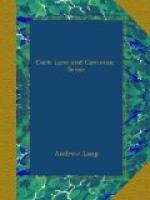‘One saw an arm, and one a hand, and one the waving of a gown,’ in that seance at Branxholme, where only William of Deloraine beheld all,
And knew, but how it mattered not,
It was the wizard, Michael Scott. {329}
Granting the ambiguous state, granting darkness, and expectancy, anything may seem to happen. But Dr. Carpenter wholly omits such cases as that of Mr. Hamilton Aide, and of M. Alphonse Karr. Both were absolutely sceptical. Both disliked Home very much, and thought him an underbred Yankee quack and charlatan. Both were in the ‘expectancy’ of seeing no marvels, were under ’the dominant idea’ that nothing unusual would occur. Both, in a brilliantly lighted room of a villa near Nice, saw a chair make a rush from the wall into the middle of the room, and saw a very large and heavy table, untouched, rise majestically in the air. M. Karr at once got under the table, and hunted, vainly, for mechanical appliances. Then he and Mr. Aide went home, disconcerted, and in very bad humour. How do ‘expectancy’ and the ‘dominant idea’ explain this experience, which Mr. Aide has published in the Nineteenth Century? The expectancy and dominant ideas of these gentlemen should have made them see the table and chair sit tight, while believers observed them in active motion. Again, how could Mr. Crookes’s lack of ’a special training in the bodily and mental constitution, abnormal as well as normal,’ of ‘mediums,’ affect his power of observing whether a plank of wood did, or did not, move to a certain extent untouched, or slightly touched, and whether the difference of position was, or was not, registered mechanically? (p. 70). It was a pure matter of skilled and trained observation in mechanics. Dr. Huggins was also present at this experiment in a mode of motion. Him Dr. Carpenter gracefully discredited as an ‘amateur,’ without ’a broad basis of general scientific culture’. He had devoted himself ’to a branch of research which tasks the keenest powers of observation’. Now it was precisely powers of observation that were required. ‘There are moral sources of error,’ of which a mere observer like Dr. Huggins would be unaware. And ’one of the most potent of these is a proclivity to believe in the reality of spiritual communications,’ particularly dangerous in a case where ‘spiritual communications,’ were not in question! The question was, did an indicator move, or not, under a certain amount of pressure? Indiscreetly enough, to be sure, the pressure was attributed to ‘psychic force,’ and perhaps that was what Dr. Carpenter had in his mind, when he warned Dr. Huggins against ’the proclivity to believe in the reality of spiritual communications’.




